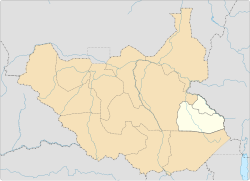History
From the beginning of South Sudanese independence, the Anyuak, Jie, Kachepo, and Murle people in Jonglei sought greater autonomy from the Jonglei State government dominated by Nuer and Dinka. The resulting armed insurrections against the Government of South Sudan, initially dispersed, coalesced into the South Sudan Democratic Movement/Army (SSDM/A), which in turn was ultimately dominated by David Yau Yau and his Cobra Faction. Peace negotiations in the spring of 2014 led to a compromise that carved out two counties of Pibor and Pochalla within Jonglei state to create the new semi-autonomous Greater Pibor Administrative Area (GPAA). [3]
The special administrative area was dissolved after the creation of Boma State in 2015. [4] [5] [6]
As a result of a peace agreement signed in February 2020, Boma State was dissolved and Pibor was reconstituted as a special administrative area. [7]
This page is based on this
Wikipedia article Text is available under the
CC BY-SA 4.0 license; additional terms may apply.
Images, videos and audio are available under their respective licenses.


